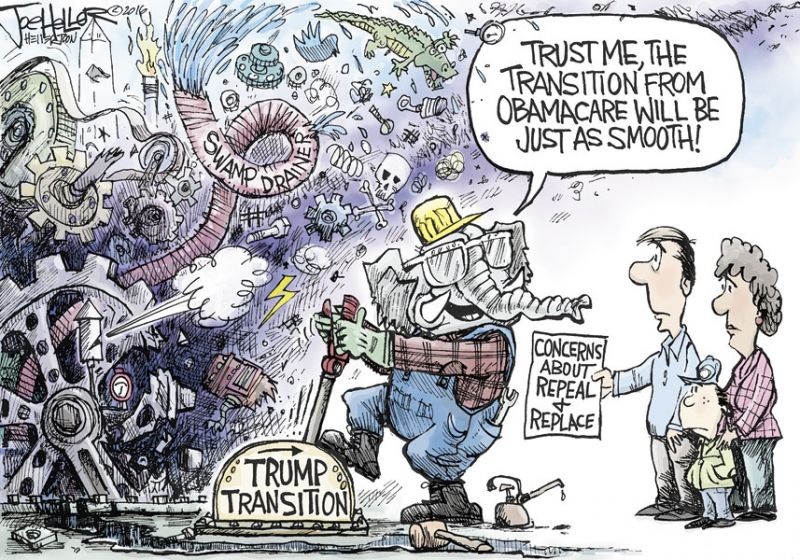Scott Gibson: Unraveling Obamacare
American health care is too expensive. This is the overriding reality of the health care debate. We spend about 18 percent of our gross domestic product on health care, more than twice the average of other industrialized countries. When it comes to spending, no one comes close.
The Affordable Care Act (ACA), commonly known as Obamacare, was supposed to control costs. And since the ACA was passed in 2010, the rate of increase in health care costs has indeed dropped by about a third, even while providing insurance for 20 million previously uninsured Americans. Still, health care costs are rising faster than the general rate of inflation. Insurance increases in some markets have spiked in the last year, pricing some people out of insurance. Not surprisingly, the ACA has strong adherents and motivated detractors. The detractors now hold the political reins of power.
Republicans finally have a chance to repeal the ACA and replace it with the “common sense solutions” they frequently mentioned. Donald Trump promised to pass something “terrific, just terrific.” But after six years and scores of votes to repeal the ACA, Republicans have no plan for its replacement. Nor does the new administration.
So what options do Republicans have to replace Obamacare? The choices are limited and problematic. If the answers were easy, Republicans would have happily developed a plan long ago instead of looking like the dog ate their health care homework. Still, conservatives have some general ideas, which are worth reviewing.
Trump has often promoted allowing insurance to be purchased across state lines, a pro-competition idea dear to many conservatives. The problem is that setting up provider panels (doctors and hospitals that will accept an insurance plan) is expensive and difficult. Georgia opened its health care market to out-of-state insurers, and not one agreed to enter. This idea is not without potential, but we should not expect it to provide dramatic cost benefits. In addition, fraudulent out-of-state policies may be hard to prevent.
Another idea frequently floated by conservatives is medical liability reform. The idea is that if doctors aren’t as worried about lawsuits, they will order fewer expensive tests. Currently, more than 30 states have liability caps of various types. Oregon is not one of these. Yet Oregon provides care on a per-patient basis at much less cost than, say, Texas, which has some of the most rigid liability caps in the country. Further, recent studies have found that tort reform has little to no effect on physician behavior or cost of care. It is unlikely that tort reform will cut costs significantly.
Trump and congressional Republicans have pushed for Medicaid block grants to states to give them greater flexibility in how to spend federal Medicaid dollars. The process also limits the amount of federal money the states receive. Since Medicaid already pays hospitals and doctors less than any other insurance plan, it is very hard to economize further, and most states would likely restrict enrollment to the poorest of the poor, as occurred before Obamacare. This would again swell the ranks of the uninsured, who would again turn to emergency rooms for care. Doctors and hospitals would be forced by law to provide care to those with no insurance and no means to pay. No wonder the American Hospital Association (AHA) and the American Medical Association (AMA) supported Obamacare and are very nervous about what direction the replacement will take.Health Savings Accounts (HSAs) could be expanded beyond the 24 percent of workers currently enrolled. However, these accounts work by providing tax benefits that are of little value to low-income Americans. Because of this, according to a recent editorial in the Journal of the AMA, “HSAs are unlikely to materially expand access,” and additional savings would likely be small.
Because the choices are few and dicey, many in Congress are looking to find ways to delay replacing the ACA. But Donald Trump said he would begin to dismantle the law by executive action “on Day One,” and the House has voted for immediate repeal scores of times. Since the Democrats would surely block actual repeal in the Senate, all that the Republicans can do is defund the law through reconciliation. This would create chaos in the markets with the subsidies stripped away but with insurers still required to pay for care regardless of pre-existing conditions. Such an outcome would lead to an insurance “death spiral.”
Hospitals are particularly spooked by repeal without a replacement plan. They stand to lose massively. Here in McMinnville, the potential cost to Willamette Valley Medical Center has been estimated at $12.6 million.
Republicans are in a tight spot on this one. Repealing Obamacare is a core promise. They have depicted the ACA as a “trainwreck,” a “disaster.” Fixing the current system would probably work, but it would be a betrayal to the conservative base. If Republicans do repeal or substantially change the law, they own health care in America. For the last seven years, Republicans have been hammering the Democrats for any cost increase, any rate hike, any glitch in health care. Repeal the ACA, and it’s payback time. It is possible that a solution will be found. There are a few promising ideas out there. But health care has been the La Brea Tar Pits of politics. The only systems ever devised that have kept prices low and coverage universal have been the highly regulated, centralized affairs found in most advanced, industrialized democracies (oh, and Medicare here in the US). These are uniformly despised by Republicans (except Medicare).
If Republicans devise a market-based system that lowers costs without throwing millions of Americans off their insurance, they will have pulled a monster rabbit out of a tiny hat and will deserve enormous credit. If they don’t, voters will not be amused. And Democrats will be waiting in the wings with Medicare for All. This is one of the biggest gambles in the history of American politics. Good luck, Donald.













Comments
gophergrabber
ACA to me means having to go to Tillamook to receive health care. FYI, the Rs have presented 6 possibilities to replace Obamacare. Healthcare is so screwed up it will take more than criticism to bring it out of the ruination as it stands now. The writer is obviously getting his news from CNN and buzzfeed.com.
Scott Gibson
Actually, the writer is getting his information from the Journal of the American Medical Association, the New England Journal of Medicine (both peer-reviewed journals), the American Hospital Association, the Atlanta Constitution, and a dose of personal knowledge after 37 years in the medical profession. That being said, I do acknowledge that the ACA needs significant alteration (as most new legislation does) to work out the significant kinks. One suggestion recently offered would be to allow people in markets where there are few options (such as gophergrabber describes) to buy into Medicaid, which is a low-overhead, low cost and comprehensive insurance. Basically, it is an iteration of the "public option" the Democrats fought for in the beginning but was shot down by failure to get a few key votes from moderate Democrats like Joe Lieberman. So fixes to the law are available, and should be worked for. But instead we are promised something terrific with no specifics. And yes, Republicans have floated a variety of legislative idea but with no coalescing around a single plan, so we are left with very little of substance.
listen*up
maybe the writer should stop over charging patients to line his bank account!anyone notice that in the last forty years,dr.s have become like lawyers,thieves in suits!
kona
Thank you for your comments Dr. Gibson. We are all in this together searching for positive solutions. I would hope that these solutions are not the result of partisan politics. As I watch the confirmation hearings for Dr. Tom Price It is easy to assume that the Democrats are not searching for solutions but are trying their best for the destruction of his nomination. There is no sense of trying to arrive at common solutions. The ACA was originally approved with almost every (I can't remember anyone saying they read the ACA before voting) Democrat voting for it without having read. There are so many places for improvement if Congress can keep the partisan politics out of the solution.
I can't see any solution for health care regardless of party. Between legal considerations, cost of insurance, cost of medical services, there just doesn't seem like there is enough "slop" in the system to make a noticeable difference.
Mudstump
Thank you Dr. Gibson. Great article.
Horse with no name
Excellent, thoughtful article Dr. Gibson, thanks!